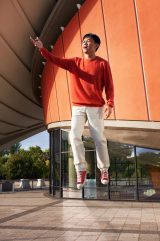PAST HISTORY
After the film “Not the homosexual is perverse, but the situation in which he lives” by Rosa von Praunheim was shown in the Arsenal cinema, about fifty people met on August 15, 1971 to discuss the possibilities of organization, practical work and actions.
In November 1971, regular meetings in the “Hands-Drugstore” finally led to the founding of the “Homosexual Action Westberlin (HAW)”.
The forty or so all male founding members were mainly students who felt they belonged to the socialist left. These initially concentrated on purely political work and actions. One focus was the advocacy of the deletion of § 175 in context of a general struggle to overcome patriarchy and capitalism. Between 1973 and 1975 the HAW organized an annual Whitsun meeting to which gay groups from other cities were invited and at which the aims of the HAW were advertised with information stands and demonstrations.
One of the most pressing concerns was to create a self-managed meeting place with the possibility of communication. This was achieved in 1973 in Rosa von Praunheim’s studio at Dennewitzstrasse 33 in Schöneberg. But only for a short time, because the building was demolished for a planned motorway construction and the tenants were offered replacement rooms in new locations beforehand.
SCHÖNEBERG, KULMER STRASSE 20A – POLITICS AND FUN
In May 1974, HAW moved to the 4th floor of a commercial building in the 3rd backyard. The queer controversy” that developed in the following years between purely politically active (“political faction”) and groups working more publicly (“fun faction”) culminated in 1977 with the dissolution of the “political faction HAW” and the proclamation of the “gay center” (short: SchwuZ ) on June 26, 1977. However, this continued to operate until the beginning of 1995 under the association register registered HAW e.V. as a sponsoring association.
The “plenary” as an open body in which anyone interested could participate, discussed and decided on actions and events. Since it was founded, the SchwuZ has been a place of rebellion, where working groups on emancipatory topics met, prepared actions and founded new projects.
The city magazine “Siegessäule”, the bookstore Prinz Eisenherz, the gay counseling service and the first CSD in 1979 were launched in SchwuZ. Another project, the “lesbian-gay press review”, was given permanent space for the collection of articles in the early 1980s.
After a larger stage was installed in August 1982, many artists used the space for rehearsals and performances. This was funded primarily by SchwuZ tunes like Melitta Poppe, Chou Chou de Briquette, Ichgola Androgynous and BeV Stroganoff, to name a few.
These were also the driving forces behind the queer ensemble “Ladies Neid”, which was founded in 1984, and whose around 20 participants included activists Melitta Sundström and Pepsi Boston, who died of AIDS in 1993. On Saturdays, gay parties established themselves under the name of “open evenings”, there were also film evenings (“Twilight – Kino im SchwuZ”) and later on Fridays the “Café in SchwuZ” arranged by SchwuZ tunes. Once a month on the “open evenings”, gay groups and projects organized benefit events for themselves, including for the “Tuntenhaus” in Bülowstrasse 55, which was repaired at the beginning of the 80s. Across all age groups, SchwuZ was predominantly shaped by politically active, left-wing alternative audiences.
KREUZBERG 61, HASENHEIDE 54 – CULTURE FACTORY
At the end of 1986 the commercial building was to be completely renovated and converted into an artist’s house. The SchwuZ had to move again and ended up after several months of closure and an intensive search in Kreuzberg at Hasenheide 54 near the Südstern. A large benefit event in the “Tempodrom” helped finance the move and the first installations.
The opening party on New Year’s Eve 1986/87 attracted more than 1000 visitors despite fewer notices, a sign of the great interest in SchwuZ. At that time, almost all of the active people were working on a voluntary basis, only cleaning staff received a fee. The proceeds were used for rent, room maintenance and solidarity donations to gay projects. In addition to the usual group meetings (plenum) and the Saturday dance events.
On Fridays, the “Café im SchwuZ” organized by SchwuZ Tunten and the film evenings continued as “Kino bei Tante Magnesia“. From then on, a multitude of cultural activities filled the calendar of events and the stage: the queer groups “Ladies Neid” and “Les Tuxx”, the “Talk-SchwuZ” moderated by Matthias Frings, the “Teufelsberg Showproduktion”, Cora Frost, Rosenstolz, Ms. Jaschke, Ronald M. Schernikau’s play “Die Schönheit” and many other artists and groups from Germany and abroad (“Bloolips”). This was made possible primarily through the tireless commitment of Chou Chou de Briquette. The fall of the Berlin Wall in November 1989 had an enormous impact on SchwuZ. In the first few weeks in particular, the rush of visitors from the eastern districts exceeded our expectations and many new contacts and friendships could be made across borders.
KREUZBERG 61, MEHRINGDAMM 61 – PARTY BASEMENT
Triggered by the owner’s new rental practice, the next SchwuZ move followed. Now we went to Mehringdamm 61, in whose basement the opening was celebrated on February 18, 1995. Shortly afterwards, the SchwuZ e.V. was founded as a new sponsoring association. In addition to the cultural events in the SchwuZ, separate party series increasingly developed. In addition, the first leases to external organizers began, because in the 1990s Berlin’s gay party life experienced a boom in new series of parties.
Some of them started in SchwuZ: This is where Doris Disse’s legendary “Club 69” had its roots, and Ken Mattel’s “Houseboys” premiered here, as did Frank Jaspermöller’s “Cockerkeller” (later “Cocker Party”). After an inspection with the Kreuzberg building supervisory authority, we decided in May 1998 to close the building for a longer period in order to implement necessary structural changes. Among other things, the existing emergency exits had to be converted and the ventilation systems adapted. Most of the construction work was carried out on a voluntary basis with well over 6000 unpaid hours of work.
At the same time, the association decided on a comprehensive structural reform. The urge for professionalization in the event sector, but also the desire to continue to function as an open communication center and meeting point, sparked controversial discussions. Ultimately, the members decided on the option of introducing a balance between a commercial event space (the SchwuZ as a “club”) and an open project without economic pressure. This reform made it possible to continue offering the rooms to interested groups, projects and artists for meetings, meetings and rehearsals.
For example, the “gay wind instruments” and the “salsa group” from the gay and lesbian sports club “Vorspiel e.V.” practiced there every week. For the CSD 1999 the SchwuZ was reopened on June 26th. At the same time, some permanent positions were created to safeguard ongoing operations and from now on the evening staff were largely paid. A second, more comprehensive structural debate in 2011 led to the current form of organization with largely autonomous teams.
NEUKÖLLN, ROLLBERGSTRASSE 26 – EVENT LOCATION
Since November 16, 2013 the SchwuZ is located in Rollbergstr. 26 in Berlin-Neukölln. Of course, it wasn’t an easy decision, but there were a number of reasons for the move. Over the years, more and more visitors came to our basement rooms in Kreuzberg and we reached the limits of what was spatially and organizationally feasible. In addition, there were more and more restrictions due to unexpected structural defects and problems with the right of passage through the upstream café, which is not operated by SchwuZ.
We see the move to Neukölln as a political mandate and our own claim to connect different cultural life with one another and be part of this rapidly developing. We are happy about the environment and the new neighborhood, because the commercial area will be expanded into an important cultural location in Neukölln in the coming years. The change of location to the former Kindl brewery offers enormous opportunities.
In addition to party operations, larger event areas also offer space for other activities such as concerts, exhibitions and discussion forums. The SchwuZ program is now enriched with new impulses and collaborations. There have recently been lavish concerts with well-known bands. This was made possible through cooperation with ARTE / Kobalt Film (“Berlin Live”) and agencies like Melt! and other organizers. The regular theme parties are a reliable feel-good factor for our guests. With events of various musical styles from pop and retro to electro and rock, almost every branch is represented with its own event at SchwuZ. And this is how different visitors find their way to the Rollberg.
In addition to in-house parties, we also continue to offer our rooms to external organizers. One example is the “L-Tunes” party, arranged by MegaDyke Productions primarily for lesbians and queer people.
Source: SchwuZ
More about THE WORLD TO COME



